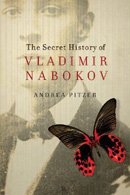Nabokov and concentration camps, part II
During the course of writing The Secret History, I was staggered by the stories I heard from sources and translators whose family lives had been shaped in brutal ways by political prisons and concentration camps. Some, like Nabokov’s family, had fled Russia westward away from Revolution or pogroms, only to have to escape Germany or […]
Nabokov, concentration camps, and a century of civilian casualties
Vladimir Nabokov was born in 1899, less than three years after the first concentration camps were founded thousands of miles away in Cuba. What does Vladimir Nabokov—creator of decadent fiction and king of literary insults—have to do with concentration camps? It’s a reasonable question. Like Nabokov, concentration camps were born in the nineteenth century but […]
Madness, intimate violence, and Stalin’s Barber
Love him or hate him for it, but Nabokov excels at depicting the exquisite intimacy of violence and the deliberate way one person exerts power over another. (For those who have read Nabokov’s most famous book, just recall Humbert Humbert erasing Lolita’s humanity as he recounts his appalling behavior in the novel’s sofa scene.) A […]
The missing crown jewels
In Vladimir Nabokov’s 1962 novel Pale Fire, hidden crown jewels haunt the narrator, Charles Kinbote. The mad, self-absorbed Kinbote believes himself to be the exiled king of Zembla, a northern ruler overthrown by a Soviet-style neighbor. Throughout the book, Kinbote references agents searching the Zemblan castle for missing jewels, but the treasures never turn up, and […]
